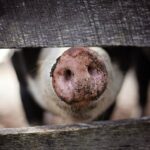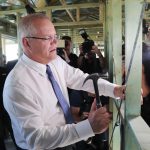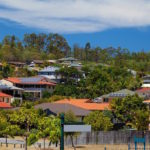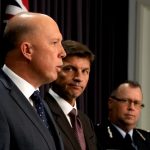Agriculture’s role in the NSW 2021 Plan
The Hon Anthony Roberts, NSW Minister for Fair Trading delivered the keynote address at the IV Global Access Partners National Economic Review: Australia’s Annual Growth Summit on Friday 20 September 2013. He outlines why agriculture plays a vital role in the NSW 2021 Plan that aims to Make NSW Number One Again.
For those unaware, this morning’s proceedings are taking place in the people’s chamber of the oldest Parliament in the country.
It is here, in the NSW Legislative Assembly, that I have the privilege of representing the Lane Cove community and the honour to fulfil my commission as Minister for Fair Trading on behalf of the people of New South Wales.
This is the fourth Growth Summit organised by our friends at Global Access Partners – otherwise known as GAP – and the third with which I have been directly involved.
The Annual GAP Growth Summit is an increasingly important and recognised event, where some of the sharpest minds in the country gather to discuss issues of national importance.
I commend those of you who have travelled long distances to join us here today.
That this year’s subject focusses on food security and opportunity demonstrates the importance of the issue, and links nicely with last year’s focus on productivity.
With the country now under new management, you can expect to see a renewed focus on increasing productivity across Australian industry – a renewed focus on freeing up business to do what business does best.
We are honoured to have two newly appointed Commonwealth Ministers with us today.
I would like to acknowledge The Hon Andrew Robb, Minister for Trade and Investment and Senator the Hon. Arthur Sinodinos, Assistant Treasurer.
Two very passionate Ministers who are strongly committed to these very issues we’re discussing today.
I suspect that much of the new Government’s focus will be on supporting innovation and better enabling industry to develop the market-driven solutions to some of the key challenges facing our community.
And this is where there is a clear intersection between the focus of last year’s Summit and this.
For in seeking to address the multiple challenges of food sustainability, in many ways we are seeking to improve the productivity of our agriculture sector and the productivity and efficiency of the markets upon which it relies.
The challenge can be seen as to how we, as a society, can nurture and develop a sustainable food system that provides for the food needs for a healthy community into the future.
Forums such as GAP’s Growth Summit are important because they enable us to have open and logical discussions about the concept of sustainability.
As a community, we cannot afford to allow the concept of sustainability to be captured by fringe groups as a byword for no-progress or regression in our society.
Sustainability is much more than the protection of our limited environmental resources.
Yes, we must look to the sustainability of our environment, but at the same time seek to ensure the sustainability of our vital industries and the sustainability of the communities those industries support.
It could be said that in no other sector is this interaction as keenly felt as in agriculture – where in many cases generations of farming families have worked and nurtured their property and their lives and production are interwoven with the communities to which they belong.
Their level of commitment cannot be understated.
This is the view taken by the O’Farrell-Stoner Government and why agriculture plays a vital role in the NSW 2021 Plan that aims to Make NSW Number One Again.
This is also why the NSW Government has joined with primary producers to begin the development of an Industry Action Plan for agriculture, the public consultation process for which recently concluded. This is also why the NSW Government has invested heavily in putting the issues of food production, agriculture and rural communities back at the heart of Government.
Immediately following its election in 2011, the Liberals and Nationals Government restored the Department of Primary Industries under the direction of my colleague, the Hon Katrina Hodgkinson MP.
Soon after, the Government created for the first time an Office of Agricultural Sustainability and Food Security.
Through the work of the office, the Government has looked to identify the state’s strategic agricultural land.
Simultaneously, the Government’s scientists, researchers and extension staff are working with farming communities to develop new, more efficient and productive crop varieties for our climactic conditions.
In particular, the Government has sought to assist farmers in increasing productivity, increasing yields and reducing water use in production.
Whilst educating the farmers of today, we are also investing in the farmers and consumers of tomorrow.
This Government understands the importance of planning for the future.
Through the NSW Government’s state-wide LandLearn program, students are introduced to primary industries with a view to educating students about the origins of what they find in their lunchbox each day.
As the Minister for Fair Trading, I see similarities in our own work with schools to improve awareness of the markets which dominate our daily lives.
This includes the MoneyStuff program focussing on financial literacy and the ‘Revved Up’ program to assist young people avoid the possible pitfalls in buying their first car.
Even more so, I see parallels in what drives the food sustainability and consumer affairs agendas.
While on the surface the two may seem incomparable, essentially they both rely on the same fundamental concepts – successful market operations, innovation in product and service delivery, and transparent information dissemination between market participants.
It is these concepts, combined with a focus on limited and appropriate regulation, that is driving the NSW Government’s Fair Trading agenda.
I have been charged by the Premier with overseeing an ambitious legislative reform agenda, a reform agenda to drive the NSW economy while maintaining appropriate consumer protections.
We have worked tirelessly to improve the reach and effectiveness of NSW Fair Trading in meeting the needs of our community.
Just this week alone, we have:
- passed legislative amendments to protect the community from the scourge of synthetic drugs;
- introduced legislative amendments to ensure child safety devices are included on all prescribed windows within the state’s residential strata schemes to reduce the incidence of child falls from windows causing serious injury or death; and
- fulfilled a 2011 Election commitment by introducing fundamental reforms for the governance of residential land lease communities.
Meanwhile, in the weeks and months ahead our work continues with:
- the release of a position paper detailing the Government’s proposed reforms to the State’s home building legislation, reducing red tape and ensuring that the sector remains best placed to drive economic growth;
- the release of a position paper detailing the Government’s proposed reforms to strata laws, supporting democratic and accountable decision-making, building a culture of community and cooperation, and empowering communities to chart their own future; and
- the introduction of legislative amendments to the regulation of motor trades, combing two existing Acts, reducing red tape for business and increasing consumer protections.
In addition to this, as of 1 October our new streamlined standard contracts for retirement villages must be in place.
Similarly, as of 1 October is will be against the law to perform a body art tattoo procedure for a fee or reward without a licence, or to conduct a body art tattooing business without a licence.
As we drive forward these myriad of reform tasks, we are ever conscious that the work of Government is never done in isolation.
Our work in the home building and strata spheres has dovetailed with the Government’s broader agenda for implementing a planning system for the future.
At the same time, we have been conscious of the work being done to support the broader construction industry through the Government’s response to the Collins Inquiry into Construction Insolvency.
Similarly, our work on synthetic drugs and children’s window safety have been examples of successful cross-portfolio cooperation, a level of cooperation that was not previously evident.
At the same time, NSW Fair Trading is also leading across the nation in collaboration with other consumer affairs regulators.
I have been proud of our leadership role in combating travelling conmen, who prey on some of our most vulnerable citizens.
NSW is always eager and ready to drive forward a necessary reform agenda.
Closer to the issue of food security and sustainability, we have been active in the assessment and substantiation of claims made with respect to food labelling.
There have been a number of food labelling issues under consideration in recent times: country of origin labelling; labelling of olive oil; the labelling of palm oil and labelling standards for free range eggs.
The Australian Consumer Law prohibits misleading and deceptive conduct and false or misleading representations, including in relation to claims that food products meet certain criteria that consumers may consider important, such as ‘free range’, ‘organic’ or ‘extra virgin’.
Penalties of up to $1.1 million can be imposed for breaches of the Australian Consumer Law.
These issues are of increasing concern to consumers, with significant cost premiums often being paid as part of these types of ‘lifestyle’ decisions.
The issue of free-range eggs has become such a concern to some consumers that CHOICE recently prepared a ‘Super Complaint’ on this issue for Fair Trading to investigate.
Another Australian-first, the Super Complaints framework, enables CHOICE to gather a body of evidence about a particular issue of concern and request that NSW Fair Trading investigate that evidence.
Fair Trading has 90 days from receipt of the Super Complaint to respond.
These issues are important and Fair Trading will act on all complaints regarding the substantiation of claims made by product suppliers.
Yet as we gather today to discuss issues of food security, food sovereignty and the constraints on domestic production, it should also be noted that we cannot allow these types of labelling issues to form the basis of soft trade barriers to competition.
Australia has the best agriculture in the world. We grow the best grains, produce the best meat, and bottle the best wine.
We are proud of this.
As we seek to ensure that the doors are always open overseas, we must also ensure that we, where appropriate, provide a level playing field at home.
Competition propels innovation and successful markets.
Coupled with appropriate and limited regulation, we can provide this competition without losing the protections that are vital for our community.
As Minister for Fair Trading and a member of the O’Farrell-Stoner Government, it is this belief that drives our reform agenda as we deliver on our commitment to Make NSW Number One Again.
Ladies and Gentlemen,
As you enjoy your time in Australia’s oldest Parliament, in Australia’s premier State, please remember that since the dawn of our nationhood, Australians have worked hard for a sustainable food and agricultural industry, and I have no hesitation in saying that I believe that our best years still lay ahead of us.
I wish you well for the rest of the Summit.
The Hon Anthony Roberts MP is the NSW Minister for Fair Trading. Prior to becoming the Member for Lane Cove, he was Mayor and Deputy Mayor of Lane Cove Municipal Council. Anthony proudly served with the Australian Army on peace keeping operations in Bougainville as part of Operation Bel Isi. He was also an adviser to Prime Minister John Howard.













